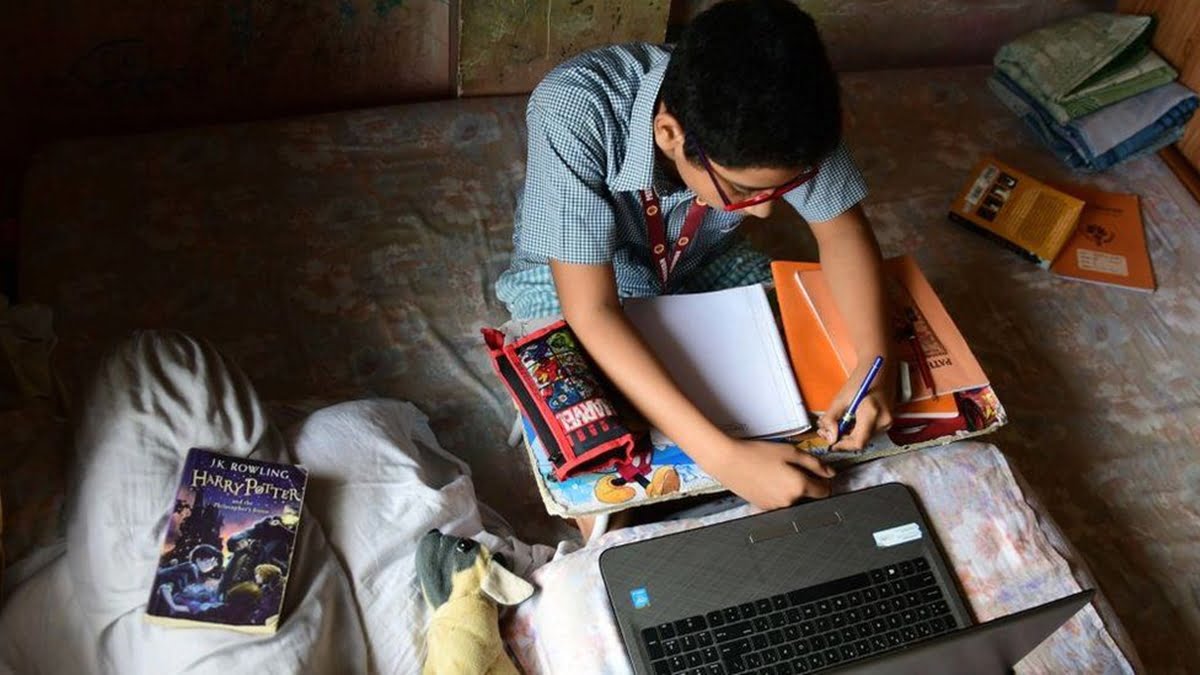Editor’s Note: FII’s #MoodOfTheMonth for October, 2021 is Navigating Complex Emotions. The pandemic has interrupted our emotions in many ways, and added to the complexities of our mental well being. FII invites submissions on coping with these complicated feelings, throughout this month. If you’d like to contribute, kindly email your articles to sukanya@feminisminindia.com
The COVID-19 pandemic has undoubtedly adversely affected the economic and health situation of the country. But it has also had a grave psychosocial impact on people around the world, especially children. Schools in India have been forced to shut and it has been over a year since children have been denied the classroom environment. Even though educational institutions are cautiously reopening now, even indulging in outdoor activities with peers has been strictly restricted for the children. For children from disadvantaged and marginalised communities, the struggle has been even harder. For one, attending online classes required mobiles, laptops and a secure Internet connection, which is a privilege for so many. For others, the struggle moved beyond just navigating academia and accessibility. As per the National Commission for Protection of Child Rights in India, 1,700 children were orphaned and 7,400 had lost a parent in the pandemic.
Amidst these realities of children oscillating from illness, loss, and trauma, how do we create safe spaces for children to share their struggles of living through a pandemic – understanding their mental health, their fears and apprehensions; difficulties in coping and learning? How do we bridge the intensified school dropout rates of girls? How do we implement better policies to reduce the societal and institutional barriers, and equip teachers to be an ally for their students, rather than just instructors?
The pandemic has amplified numerous (existing) societal barriers underlined with an increase in the gender gap in education. Closure of schools and the shift to digital education around the world has affected girls’ education – both directly and indirectly. India is already home to 1.6 million girls being currently out of school. According to the Right to Education Forum policy brief –as many as 10 million girls in India could drop out of secondary school due to the pandemic.
My mother is a school teacher and it is heartbreaking every time I see her reason with a parent on why they shouldn’t give up on their girl child’s education. The fact that families (still) tend to choose boys and prioritise their education over girls, claiming the latter to be a financial burden, is disheartening.
A recent study by the Malala Fund showed that increased rates of poverty, household responsibilities, child labour, and teenage pregnancy may prevent as many as 20 million secondary school-aged girls around the world from ever returning to the classroom. The repercussions of girls’ dropping out of school ranges from – menstrual taboos, inequitable attitude and discriminatory perspectives to abuse and violence, loss of reproductive and sexual health education and rights, etc.
A recent study by the Malala Fund showed that increased rates of poverty, household responsibilities, child labour, and teenage pregnancy may prevent as many as 20 million secondary school-aged girls around the world from ever returning to the classroom. The repercussions of girls’ dropping out of school ranges from – menstrual taboos, inequitable attitude and discriminatory perspectives to abuse and violence, loss of reproductive and sexual health education and rights, etc.
Socialisation, play and physical contact with peers is a crucial part of a child’s growing years, and plays a critical role in the development of their psychosocial well-being. Many children might be feeling confused and lost given the current situation, which would further lead to constant mood swings, anxiety, frustration, and many more mental health issues. Adolescents who are going through a time of understanding themselves, their bodily and mental changes and the world, at this age, would also be finding navigating the pandemic extremely difficult, especially since their physical and social interactions have been restricted.
According to the UNICEF, at least 1 in 7 children – or 332 million globally – has lived under required or recommended nationwide stay-at-home policies for at least nine months since the start of the COVID-19 pandemic, putting their mental health and well-being at risk.
Moreover, parents and other adults in the family and school are also not equipped enough to understand their children in the current situation and are forging ways to communicate better. The pandemic has brought about new kinds of challenges for parents, teachers and caregivers, to be able to engage with children and converse with respect to their mental well-being. When I see my mother taking classes online, I realise that the scope of change in institutions is currently bleak because the teachers are constantly overburdened with finishing their syllabus, and other administrative work. The current situation is new and difficult for everyone, and neither the students nor the teachers are emotionally trained enough to talk and understand about the mental health and well-being of the children, and of themselves.
As children have been heavily dependent on the rectangular screens in front of them for education for over a year now, it’s important to talk to them beyond academic curriculum. A typical day during an online school session consists of four to five academic classes. During the current situation, children can easily get overwhelmed with ‘all-work-and-no-play’. Hence, it is critical to have dialogues with them around what activities they are engaging in the most currently, how they are feeling, and provide a forum for them to freely and safely express themselves. Rather than just being silent spectators, this would help the children to talk about their fears, apprehensions, etc. Keeping this in mind, there are several organisations, including ours, that conduct workshops which cater to topics of positive online engagement, online threats and how to combat them, the importance of consent; mental health of children, fake news and misinformation, etc.

During the current situation, children can easily get overwhelmed with ‘all-work-and-no-play’. Hence, it is critical to have dialogues with them around what activities they are engaging in the most currently, how they are feeling, and provide a forum for them to freely and safely express themselves.
Since we implement the workshops and constantly engage with school-aged children, educators and various other stakeholders, we would like to put forth some recommendations for mitigating the impact of the pandemic on education –
1. Make supporting the marginalised gender communities an important theme in all policy implementations on education– at all levels.
2. Increase the education budget, keeping in mind gender-based disparities and the amplified gender gap due to the pandemic.
3. Sensitize children, educators and parents on issues of digital safety, gender rights, and mental health. Since it is not always possible for the schools alone to do so – collaborations with civil society actors and NGOs should be taken into account.
4. Focus on women’s leadership and representation at all levels so that greater emphasis is given to educational committees and policy making strategies through the lens of gender.
5. Focus on issues that lead to drop-outs like – financial burden, nutritional and menstrual hygiene requirements for the sexual and reproductive health of girls.
6. Strengthen the implementation of grievance redressal mechanisms in case of any kind of educational rights violations.
Childhood is the most beautiful and crucial period of our lives which builds the foundation of our individuality. This age and time is the starting point for us to build our mental and emotional resilience. Therefore, together, we need to work towards mitigating the effects of COVID-19, and make our children feel secure and happy in living with the ‘new normal’.
References
Das, Ravindranath (2021). “Indian schools must help children overcome the trauma of the pandemic” Retrieved from https://blogs.lse.ac.uk/covid19/2021/07/27/indian-schools-must-help-children-overcome-the-trauma-of-the-pandemic/
Ghatak, Yarasmee, et.al. (2021). “Gendered impact of Covid-19 on education of school-aged children in Uttar Pradesh”
Retrieved from http://cbps.in/wp-content/uploads/UP-Policy-Brief-1.pdf
Malala Fund (2020). Girls’ education and COVID-19: What past shocks can teach us about mitigating the impact of pandemics.
Retrieved from https://malala.org/newsroom/archive/malala-fund-releases-report-girls-education-covid-19
The Right to Education Forum (2021). National Policy Brief.
Retrieved from http://rteforumindia.org/wp-content/uploads/2021/03/National-Policy-Brief.pdf
Thomas (2021). “Covid orphaned 1,700 children, another 7,400 lost one parent, Supreme Court told” Retrieved from
https://www.hindustantimes.com/india-news/covid-orphaned-1-700-children-another-7-400-lost-one-parent-supreme-court-told-101622476669678.html
Trivedi (2021). “10 million girls at the risk of dropping out of school because of Covid-19 pandemic: RTE Forum” Retrieved from https://frontline.thehindu.com/dispatches/10-million-girls-at-risk-of-dropping-out-of-school-because-of-the-covid-19-pandemic-says-rte-forum-policy-brief/article33662229.ece
Wylie (2020). “Children at increased risk of harm online during global COVID-19 pandemic” Retrieved from https://www.unicef.org/press-releases/children-increased-risk-harm-online-during-global-covid-19-pandemic
UNICEF (2021). Press Release. Retrieved from https://www.unicef.org/bulgaria/en/press-releases/least-1-7-children-and-young-people-has-lived-under-stay-home-policies-most-last
Shruti Das is an Assistant Project Coordinator at the Centre for Social Research (CSR), India. She has been working in the development sector for the past two years in the intersection of gender, digital technologies, children & education. Previously, she has worked as a researcher with SDG Society, funded by the US Department of State (YES Alumni Grants), pre-incubated at Nirmaan, Indian Institute of Technology (IIT), Chennai. She holds a Master’s degree in Politics with Specialisation in International Relations from Jawaharlal Nehru University. You can find her on Twitter and Instagram.
Featured image source: BBC




